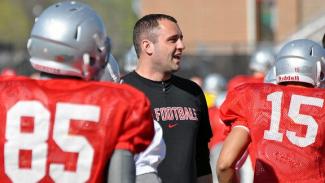 Workin' for the man every night and day
Workin' for the man every night and dayZach Smith, Ohio State wide receivers coach, walks slowly through the doorframe of a dilapidated plywood shack, an icy wind cutting through his trembling visage and shaking him to his very marrow.
He is met by his wife, a stout Irish lass with soft black hair, and his two sons; thin, toes poking out of their threadbare socks as they look up at him with watery eyes of deep brown.
"So, husband? Surely Mister Urban was generous this time?"
"Yes, daddy! A-Are we going to be able to eat meat? Did you get your raise?"
Zach cannot bear to meet the gaze of his hopeful family. He bites his lower lip, staring sadly at the ceiling.
"Yes, son. I got that raise. But..." Zach grips his wife's shoulder as he gives his loving family the devastating news, "...it's only five thousand more dollars. I'm afraid... I'm afraid we have to eat Rufus. Get me his leash."
...
You could've avoided this scene, Urban! But no, no, your miserly ways have once again forced a family man to resort to eating a beloved family pet. Have you no shame? Do you really believe that a man can live off of $155,000? How do you sleep at night knowing that you forced Luke Fickell to take a pay cut of $150,000, meaning that he is now going to have to find some way to keep his family alive on a mere 600,000?
This is no way to manage your employees. They are human beings, coach, not playthings for you to abuse and manipulate in your never ending quest for fame and championships. You sicken me.
Zach Smith will probably, probably be okay. $155,000 should be enough to buy bread and milk for his family, assuming the sales tax isn't too bad for him.
And, to be fair to Urban, he did recently raise the salaries for his assistants by a decent amount. The top three salaries for assistant coaches at Ohio State now make north of 1.7 million combined, and even the head man himself got a nice 158k raise in his Christmas stocking this year.
The crazy thing is that this all pales in comparison to some of the salaries that the perpetually sunny and kind Nick Saban is giving to his assistants, along with some other major (mostly southern) programs. To wit:
• Alabama defensive coordinator Kirby Smart’s salary was raised to $1.2 million earlier this year.
• LSU is paying defensive coordinator John Chavis $1.1 million, and hired former Baltimore Ravens offensive coordinator Cam Cameron for that same job with a three-year, $3.4 million contract.
• At Clemson, offensive coordinator Chad Morris is in the midst of a six-year contract that pays him $1.3 million annually, and defensive coordinator Brent Venables is expected to make $850,000 this year.
And Clemson's defense kind of sucks! Imagine what he'd make if Clemson was as good defensively as, say, the Ohio Bobcats, which fielded a slightly better scoring D with a head coach that makes $350,000 less than Venables. Cam Cameron, whose mid-season firing ended up improving a team enough that it went from also-ran to winning the Super Bowl, managed to get over 1.1 million a year thrown at him by a guy who eats grass.
How do you even explain this to a person in real life? That people, some with marginal rates of success, have access to Scrooge McDuckian levels of cash that is increasing as exponentially as the profits are from the apparatus that props them up, and that there is zero chance of that ever being regulated or leveling off. Can furrowed brows create electrical power? There might be money in that.
Still, I'm not here to rant about salaries per se; it'd be easy for me, as a high school teacher with a Master's degree that'll make just slightly north of $39,000 next year (after a 1.5% raise, party at my place!) to whine and complain about our misplaced priorities as a society and how we have a system that's set up to glorify and venerate those who don't particularly need that glory and veneration, but that's old hat.
All true, but old hat.
The thing is, I work very hard, have a decent education, and I get paid to do something I genuinely enjoy doing. The money I make is enough for me, and frankly is not a consideration for me as far as whether I want to do a job or not.
If I could pay my loans and rent and take my girlfriend out to the movies sometimes, I'd be okay with making half of what I am right now (please do not take this seriously, current employer), and I'm even okay with knowing that people with a similar education as mine have a ridiculously higher earning potential than I do, because I love my job.
But as much as I love my job, and as important I think it is for the public good, I wouldn't do it for free. And I probably wouldn't do it for almost free, either.
The combined raises for Everett Withers, Tom Herman, Ed Warinner, Kerry Coombs, Stan Drayton, Mike Vrabel, Tim Henton, Zach Smith, and Urban Meyer totaled $504,000. That's enough to pay the 88 named football players on the official Ohio State football website over $5,700 each, and it strikes me as odd that even though the competition for recruits is unarguably tougher and more cutthroat than the hiring of coaches, the money involved is magnitudes less (some schools excepted).
It's understandable, then, that players present and former are beginning to question their role in this situation. Referring to the recent lawsuit against the NCAA about the use of player likenesses in video games, University of Nebraska chancellor Harvey Perlman had this to say about the issue:
"If you’re going to start paying players and making this professional, then I don’t think it can be defended that this ought to be within the context of higher education," Perlman said. "The fact that [University of Alabama head football coach] Nick Saban makes $6 million I think is an outrage, but that doesn’t have anything to do with whether you pay athletes."
I disagree, but to make that argument, two things need to happen: first, colleges need to start offering up legitimate reasons why players aren't entitled to that money. Players, whose devotion to their craft is just as strong as my devotion to mine, are being continually reminded by these new contracts and raises given to their coaches that their own services aren't as valuable, despite the fact that they're the ones actually playing the game.
Colleges that can afford to help out a fictitious version of Zach Smith by throwing him 5k can certainly help out a real version of a kid from a poor household that is clearly doing a financial service to the university in the same capacity as any official employee.
Second, someone needs to fully quantify what the college football player is owed through his services and what he receives in return. A serious conversation about this issue cannot take place until both sides are frank and honest about the hours a student-athlete works, the stipend that they receive, and the overall net monetary value of what a player in an athletic program means to a university.
Ultimately, this isn't about how poor Zach Smith won't be able to give his children fancy wines without an extra five thousand dollars in his paycheck, or even about how Curtis Grant won't be able to put a down payment on a used 2001 Chevy Cavalier without help, or even even about whether someone can buy some McNuggets for Carlos Hyde without it being a rules violation.
It's about what's fair, and what's equitable. And it's time for schools to justify why they think the current system is both.

